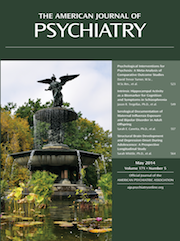Response to Kuo et al.
To the Editor: The letter by Kuo et al. aimed to discuss the bleeding risk of selective serotonin reuptake inhibitors (SSRIs) in combination with aspirin or nonsteroidal anti-inflammatory drugs (NSAIDs). From our results, the authors found that NSAIDs were associated with a higher risk for upper gastrointestinal bleeding than aspirin when in combination with SSRIs (adjusted odds ratios of 3.44 and 2.07, respectively). They found the result was contrary to those from one previous study (1) (adjusted odds ratios for NSAIDs and aspirin were 1.79 and 2.2, respectively).
Actually, in our article, we raised the issue that short-term use of SSRIs is associated with increased risk of upper gastrointestinal bleeding just like aspirin and NSAIDs. Our data also showed that SSRIs in combination with either aspirin or NSAIDs would further increase such bleeding risk. However, we made no attempts to infer that aspirin is safer than NSAIDs when in combination with SSRIs with regard to the risk of gastrointestinal bleeding. In addition, we cannot agree with the proposed mechanism in trying to explain the seemly lower bleeding risk of aspirin than that of NSAIDs. The 95% confidence risk intervals of gastrointestinal bleeding overlapped between aspirin and NSAID users, suggesting nonsignificant differences in risk between the two drugs when in combination with SSRIs. Furthermore, we don’t agree that prescription patterns in Taiwan are different from those of Western countries. In Taiwan or in Western countries, aspirin is mainly used in low doses for the purpose of long-term cardiac protection. This is also the reason why most researchers are more interested in the risk of gastrointestinal bleeding among low-dose, but not high-dose, aspirin users. Furthermore, the major clinical applications for aspirin and NSAIDs are different (i.e., cardiac protection versus pain control). Thus, in our opinion, it is not justifiable to compare the risk of gastrointestinal bleeding between the two drugs.
In the Dall et al. article (1), the authors actually found that SSRIs in combination with NSAIDs had higher odds ratios for gastrointestinal bleeding than SSRIs with aspirin (8.0 and 3.0, respectively), a similar trend to our results. It was in the subgroup analysis or stratum-specific analysis that they found contradictory results as described above (odds ratios of 1.79 and 2.2).
We do agree with the author that over-the-counter drugs can be a confounding factor. But this limitation is almost always unavoidable in all studies using a population-based database, since information about over-the-counter usage was not available in the data. This limitation would eventually underestimate the bleeding risk in both aspirin and NSAIDs in combination with SSRIs. We agree that the use of clopidogrel may confound the results. However, the number of patients receiving clopidogrel in our study was too small to conduct further subgroup analysis. In addition, although some SSRIs may inhibit the activity of P450, leading to decreased antiplatelet effect of clopidogrel, a recent population-based study (2) found that SSRIs with dual antiplatelet therapy of both clopidogrel and aspirin would actually increase the risk of bleeding (odds ratio=2.35) than with either clopidogrel (odds ratio=1.76) or aspirin (odd ratio=1.46).
Finally, Kuo et al. claimed that there exists evidence to support the lower bleeding risk in high-dose users. However, we found that such description could not be identified in either the provided citation (reference 4) or other literature. Actually, a prospective study has shown that the risk of gastrointestinal bleeding was strongly related to higher aspirin doses (3).
In summary, short-term SSRI use is associated with increased risk of gastrointestinal bleeding. Combining either aspirin or NSAIDs with SSRIs would further increase such risk. To compare the gastrointestinal bleeding risk between aspirin and NSAIDs in combination with SSRIs may not be justifiable, since the main clinical applications of the two drugs are different.
1 : An association between selective serotonin reuptake inhibitor use and serious upper gastrointestinal bleeding. Clin Gastroenterol Hepatol 2009; 7:1314–1321Crossref, Medline, Google Scholar
2 : Risk of bleeding associated with combined use of selective serotonin reuptake inhibitors and antiplatelet therapy following acute myocardial infarction. CMAJ 2011; 183:1835–1843Crossref, Medline, Google Scholar
3 : Long-term use of aspirin and the risk of gastrointestinal bleeding. Am J Med 2011; 124:426–433Crossref, Medline, Google Scholar



